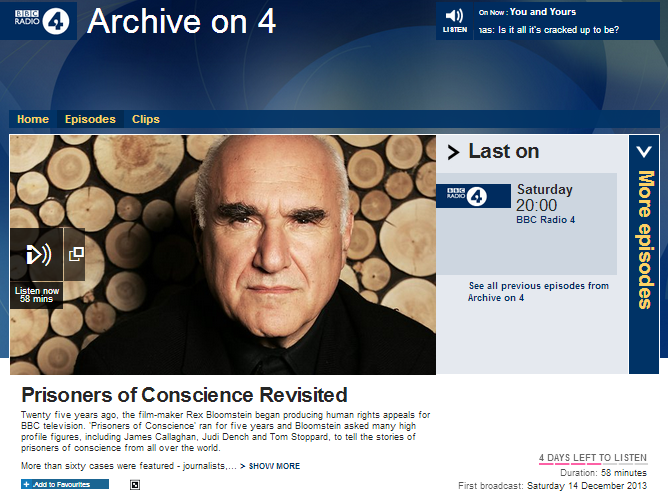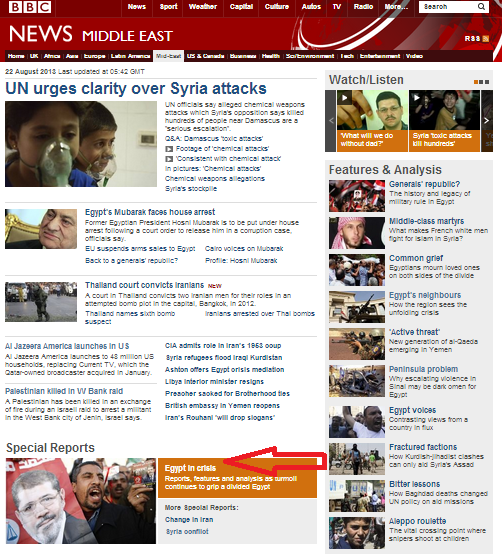h/t OR
On December 14th BBC Radio 4 broadcast an edition of its programme ‘Archive on 4’ titled “Prisoners of Conscience Revisited”.
“Twenty five years ago, the film-maker Rex Bloomstein began producing human rights appeals for BBC television. ‘Prisoners of Conscience’ ran for five years and Bloomstein asked many high profile figures, including James Callaghan, Judi Dench and Tom Stoppard, to tell the stories of prisoners of conscience from all over the world.
More than sixty cases were featured – journalists, politicians, academics, writers, clerics as well as ordinary people – all imprisoned unjustly or for their beliefs.
Now Bloomstein revisits some of those stories and discovers what has happened since. When were the prisoners released? How did they recover? And what have they done since?”
The programme can be heard here for a limited period of time or, in the UK only, on BBC iPlayer.
Dotted among the stories from Malawi, Vietnam, Bahrain and Syria are two others which raise questions regarding the editorial decisions behind their inclusion in the programme.
Given that Israel is the only country in the Middle East categorized by Freedom House as ‘Free’, listeners might be somewhat puzzled to hear Rex Bloomstein say at 28:45:
“One part of the Middle East we could not ignore was Israel and Palestine.
Listener puzzlement will only increase with the next sentence.
“Rabbi Julia Neuberger presented the case of Abie Natan – an Israeli peace activist.”
(Where the BBC Pronunciation Unit was when this programme or the original were recorded is unclear, but Abie Natan’s first name is not pronounced the same way as the first half of the title of the former British building society Abbey National.)
Listeners then hear the archive recording of Neuberger saying:
“His crime is that he went to talk to Yasser Arafat, chairman of the Palestine Liberation Organisation. Abie Natan is a remarkable eccentric who refuses to give up. He’s been fighting for peace in the Middle East ever since 1966.”
The programme goes on to describe Abie Natan’s well-documented activities, but what is important here is to remember that this programme bills itself as addressing the issue of people “imprisoned unjustly or for their beliefs”.
In August 1986 an addition (proposed by Shimon Peres) was made to the anti-terrorism laws in Israel which made meeting with members of a terrorist organization – and specifically the PLO – either within Israel or abroad an offence. Six and a half years later, with the Oslo Accords just round the corner, that clause was annulled but when Abie Natan was sentenced to 15 months of imprisonment as a result of his meetings with Yasser Arafat, the law was still in force, as Natan well knew, having gone on a forty-day hunger strike to protest it just months beforehand. Natan chose not to appeal against his sentence, but was released early due to the intervention of Israel’s president at the time, Haim Herzog.
Whatever one thinks of Abie Natan’s various campaigns, one thing is clear: he was not imprisoned for his “beliefs” or “unjustly”. He was imprisoned because he broke a law – knowingly and publicly – with which he disagreed, but which nevertheless was at the time the law. Bloomstein’s attempt to paint Natan as a ‘prisoner of conscience’ imprisoned by some dark regime is not only disingenuous, but revealingly completely airbrushes from the picture any mention of the PLO’s terrorism and the danger it presented to Israel at the time. Revealingly too, he has nothing to say apparently about the human rights of the victims of the terror organization with which Abie Natan chose to meet.
But Bloomstein is by no means done. His next subject is introduced using an archive recording of Yehudi Menuhin saying dramatically:
“The story I’m about to tell you would be an indictment of the human race at any time. Perhaps you will understand why, as an old Jew, it saddens me particularly”.
Menuhin goes on:
“Dr Jad Ishaq is a Palestinian and the former Dean of the Faculty of Science at Bethlehem University on the West Bank. He has a PhD from the University of East Anglia.”
Bloomstein interjects:
“Yehudi Menuhin to me was the perfect choice to tell the story of Jad Ishaq, a Palestinian academic that we profiled in 1988.”
Jad Ishaq is then heard saying:
“It seems so far away twenty-five years ago.”
RB: “We managed to track down Dr Ishaq in Jerusalem.”
JI: “But still the memories of those days are imprinted in my brain.”
RB: “He began by telling me of the campaign of civil disobedience that led to his arrest during the intifada [background recording of voices chanting ‘Allahu Akbar’] – the Palestinian uprising in 1988.”
JI: “We decided that it might be a good idea to try to go back to the land, to start planting their gardens to produce the necessary food needed to their families.”
The programme then cuts to archive recording of Menuhin saying:
“From a small shed Dr Ishaq gave advice about how to grow crops and vegetables, especially to the people who were out of work.”
JI: “This empowered people. They became very proud and this was a very strong message to tell them we do not want the occupation to continue. We want to have a free Palestine. We want you to be our good neighbours, but we don’t want you as our occupiers.”
Back to Menuhin:
“Dr Ishaq found himself subjected to growing military harassment. His phone was cut off, soldiers parked their jeeps outside his house and spent the night revving their engines and sounding their horns.”
JI: “We decided that we will have Israelis stay in Palestinian homes and the Israelis came to Beit Sahour – about 25 families – they stayed with 25 Palestinian families in Beit Sahour. We broke the bread together, we had dinner together.”
RB: “There were no violent protests?”
JI: “Nothing! Not one single stone to be thrown or any violent thing to happen, not to give the army the excuse to say that we are violent people.”
RB: “Why were you arrested? What happened?”
JI: “Well, there is a military order regime which says that you can put people up to six months for administrative detention – in other words without showing the charges implicating why they were arrested – and this was used against me and I was put in jail for six months.”
RB: “Why were you a danger to them?”
JI: “Because I think the reason is that demonising the Palestinians and labelling them as terrorists this is the easy thing to be able to justify actions against them, but when you have someone like me who hates even killing a fly and who adopts peaceful ways of expression…”
RB: “Yeah..”
JI:”..this is very dangerous because it undermines the Israeli propaganda machine that all Palestinians are genetically modified objects.”
RB: “You mean programmed for terrorism?”
JI: “Exactly.”
RB: “The six months Dr Ishaq spent in detention he told me changed his life.”
JI: “For me it was a learning experience. Remember before I was arrested I was the Dean of Science at Bethlehem University. In other words I was living in an ivory tower. I never got to know the grass-roots, the masses, the people. But in Ansar 3 I met people from all different backgrounds…”
RB: “Yeah…”
JI: “…and I came to realize that there is a big gap between the university and the street and it made me feel very close to the people.”
RB: “And since his release he has moved away from academia and dedicated his life to researching water, environment and agriculture to help increase self-reliance for the Palestinian people. I was encouraged that Dr Ishaq’s experience in prison had inspired him to work for human rights for his people…”
Notably, Bloomstein makes no attempt whatsoever to adequately inform audiences with regard to the strict rules governing administrative detention – also practiced in the UK, Ireland, the US and Australia – and his portrayal of the first Intifada as a benign “campaign of civil disobedience” of course conceals its violent nature and the fact that Israelis were killed in Molotov cocktail attacks, shootings, explosions and attacks with hand-grenades. Neither does he challenge Ishaq’s ridiculous portrayal of an “Israeli propaganda machine” which supposedly depicts Palestinians as “genetically modified objects”. And yet again, the human rights of the victims of terror do not appear to interest Rex Bloomstein.
Of course it is difficult to establish the exact grounds upon which Jad Ishaq was detained in the pre-internet days of 1988, but it is safe to assume that it was not the horticultural tips he dispensed to Palestinians from his “small shed” which were the reason for his arrest.
In contradiction of BBC editorial guidelines on impartiality, Bloomstein also neglects to tell the whole story behind Ishaq’s (also spelt Isaac) current day activities, avoiding making clear that he heads the Applied Research Institute Jerusalem (ARIJ) – a politically motivated NGO which is:
“Among the leaders of the political warfare against Israel, seeking to further boycotts, divestment and sanctions (BDS), false accusations of Israeli “apartheid” and “racism,” and support for a Palestinian “right of return”, which is inconsistent with two-state solution.”
Then again, neither is Bloomstein upfront on the subject of his own political affiliations. But for those still wondering why the stories of Abie Natan and Jad Ishaq made it into this BBC programme on the subject of ‘prisoners of conscience’, perhaps the knowledge that Bloomstein is a signed up member of ‘Jews for Justice for Palestinians’ will help clarify how this broadcast became a platform for stealth delegitimisation of Israel cloaked in the language of human rights.





